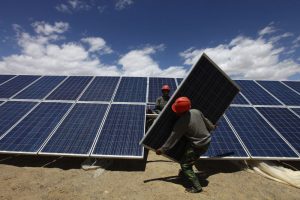Australia banned TikTok from all federal government-owned devices over security concerns on Tuesday, becoming the latest US ally to take such action against the Chinese-owned short video app.
With Australia’s ban, all members of the so-called Five Eyes intelligence-sharing network – which consists of Australia, Canada, the United States, Britain and New Zealand – have banned TikTok from government devices. France, Belgium and the European Commission have announced similar bans.
Australia’s ban will come into effect “as soon as practicable”, Attorney-General Mark Dreyfus said in a statement. Exemptions would only be granted on a case-by-case basis and with appropriate security measures in place, he said.
Also on AF: TikTok Facing US Ban if Chinese Owners Don’t Sell Stakes
Australian lawmakers can still use TikTok on personal phones but some, including federal Government Services Minister Bill Shorten and Victoria state Premier Daniel Andrews, have decided to delete their accounts.
The ban underscores growing worries that China could use the Beijing-based company, owned by ByteDance, to harvest users’ data to advance its political agenda, undermining Western security interests.
It also risks renewing diplomatic tensions between Australia and its largest trading partner after the situation had eased since Prime Minister Anthony Albanese took office in May.
TikTok ‘extremely disappointed’
TikTok said it was extremely disappointed by Australia’s decision, calling it “driven by politics, not by fact”.
The app’s CEO Shou Zi Chew, in testimony before the US Congress last month, repeatedly denied the app shares data or has connections with the Chinese Communist Party.
TikTok’s Australia and New Zealand General Manager Lee Hunter said the app should not be singled out.
“There is no evidence to suggest that TikTok is in any way a security risk to Australians and should not be treated differently to other social media platforms,” Hunter said in a statement.
The Australian newspaper late on Monday reported Albanese had agreed to the ban after a review by the Home Affairs department.
Dreyfus confirmed the federal government had recently received a “Review into Foreign Interference through Social Media Applications” report and that its recommendations remained under consideration.
Trade talks ‘going well’
The ban comes on the day Australian and Chinese officials held talks in Beijing in a bid to normalise trade after several years of conflict.
“Things are going well, but of course, it’ll take some time to turn this ship around,” Trade Minister Don Farrell told Sky News, referring to prospects for improving trade relations.
In 2018, Australia banned China’s Huawei from providing equipment during the rollout of its 5G network, riling China. Ties soured further after Canberra called for an independent investigation into the origin of Covid-19.
China responded by imposing tariffs on Australian commodities.
- Reuters, with additional editing by Vishakha Saxena
Also read:
Australia Was China’s Top Trade Restrictions Target – Study
US Big Tech Gather Data Too, Says Senator Opposing TikTok Ban
Japan Urged to Draw Up TikTok, Social Media Banning Bill
China Says US Has Failed to Prove TikTok is a Security Threat
China Buys Australian Cotton in Anticipation of Trade Ban Lift
























